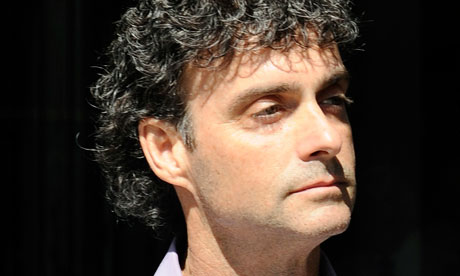BP accused of attack on academic freedoms after scientists subpoenaed
Oceanographers say they fear erosion of scientific process after they were forced to turn over emails related to BP oil spill
Former BP engineer Kurt Mix was charged last April with destroying evidence after he deleted text messages discussing the stricken well. Photograph: Pat Sullivan/AP
A pair of scientists have accused BP of an attack on academic freedom after the oil company successfully subpoenaed thousands of confidential emails related to research on the Gulf of Mexico oil disaster.
The accusation from oceanographers Richard Camilli and Christopher Reddy offered a rare glimpse into the behind-the-scenes legal maneuvering by BP in the billion-dollar legal proceedings arising from the April 2010 blow-out of its well.
It also heightened fears among scientists of an assault on academic freedoms, following the legal campaign against a number of prominent climate scientists.
In an opinion piece in the Boston Globe, the scientists, from the Woods Hole Oceanographic Institution, said they volunteered in the early days of the spill to deploy robotic technology to help BP and the Coast Guard assess how much oil was gushing from the well.
The two researchers turned over some 50,000 pages of research notes and data to BP. But BP demanded more, and obtained a court subpoena for the handover of more than 3,000 confidential emails. The scientists handed over the emails last week – but with severe misgivings, they wrote.
"Our concern is not simply invasion of privacy, but the erosion of the scientific deliberative process," they wrote. They feared the email exchanges, in which the scientists discuss hitting dead ends or challenging each other on their conclusions, were open to deliberate misinterpretation.
"Incomplete thoughts and half-finished documents attached to emails can be taken out of context and impugned by people who have a motive for discrediting the findings. In addition to obscuring true scientific findings, this situation casts a chill over the scientific process. In future crises, scientists may censor or avoid deliberations, and more importantly, be reluctant to volunteer valuable expertise and technology that emergency responders don't possess."
The struggle over the emails indicates the looming legal significance of any data related to the flow of oil from the stricken well.
A former BP engineer was charged last April with destroying evidence after he deleted text messages discussing the flow of oil from the stricken well.
The justice department indicated at the time that Kurt Mix, the former engineer, was only the first to face criminal charges. The Wall Street Journal reported last week that officials were investigating whether BP executives lied to Congress about the spill during closed door briefings in the early days of the disaster.
A spokesman for BP declined to respond to the scientists on Monday.
Michael Halpern, of the Union of Concerned Scientists, said it was a shoddy way to treat scientists who had volunteered to help the country in a time of crisis.
"The Woods Hole scientists saw a country in need and tried to do the right thing, and in the process got burned by a system that does not protect them. And the potential consequences are profound. Sure, scientists might be less likely to ask tough questions of each other in an environment where every sentence they write could be misrepresented," he wrote. "But they will also begin to think twice about using their knowledge to solve pressing and urgent national problems."








No comments:
Post a Comment